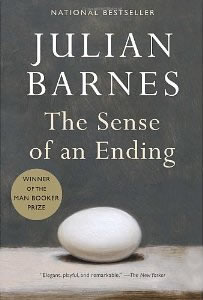Book Notes
 Julian Barnes, The Sense of an Ending: A Novel (New York, Knopf, 2011), 163pp.
Julian Barnes, The Sense of an Ending: A Novel (New York, Knopf, 2011), 163pp.
In his latest novel, the British writer Julian Barnes explores the relationship between personal memory, self-identity, aging, and, by the end of the story, deep regret. To some extent, we are who we remember ourselves to be, and as the story unfolds, we learn just how problematic memory is. Memory can be self-serving, whether consciously or unconsciously. It's selective, partial, even involuntary. Some times we drag up memories to apportion blame. There are some things we can never forget, and others we can never remember, with no obvious reason for either case.
The protagonist Tony Webster struggles to remember rightly about his last forty years. But it's not easy, even as the very first paragraph of the book foretells: "This isn't something I actually saw, but what you end up remembering isn't always the same as what you have witnessed." In fact, two times in the novel he wonders whether history is not "that certainty produced at the point where the imperfections of memory meet the inadequacies of documentation" (18, 65).
There's one document that Tony can't deny. Late in the story, he's presented with a toxic letter that he wrote long ago but had forgotten. This letter from his younger self shocked his older self. "All I could plead was that I had been its author then, but was not its author now. Indeed, I didn't recognize that part of myself from which the letter came. But perhaps this was simply further self-deception." This letter marks the movement of the story from the mere vagaries of memory and aging to an acute sense of regret and remorse for Tony. And so, when you get older you become less certain about who you really are. Tony senses an ending, not in the temporal sense, but in the sense that he can't expect anything other than an uncertain identity whose main characteristic is remorse, and about which he can do nothing.


